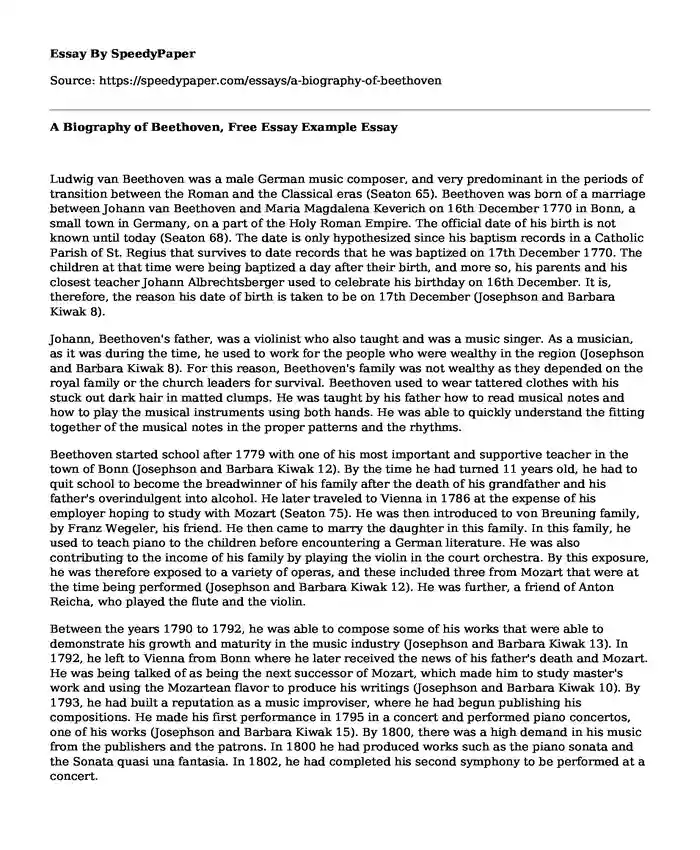Ludwig van Beethoven was a male German music composer, and very predominant in the periods of transition between the Roman and the Classical eras (Seaton 65). Beethoven was born of a marriage between Johann van Beethoven and Maria Magdalena Keverich on 16th December 1770 in Bonn, a small town in Germany, on a part of the Holy Roman Empire. The official date of his birth is not known until today (Seaton 68). The date is only hypothesized since his baptism records in a Catholic Parish of St. Regius that survives to date records that he was baptized on 17th December 1770. The children at that time were being baptized a day after their birth, and more so, his parents and his closest teacher Johann Albrechtsberger used to celebrate his birthday on 16th December. It is, therefore, the reason his date of birth is taken to be on 17th December (Josephson and Barbara Kiwak 8).
Johann, Beethoven's father, was a violinist who also taught and was a music singer. As a musician, as it was during the time, he used to work for the people who were wealthy in the region (Josephson and Barbara Kiwak 8). For this reason, Beethoven's family was not wealthy as they depended on the royal family or the church leaders for survival. Beethoven used to wear tattered clothes with his stuck out dark hair in matted clumps. He was taught by his father how to read musical notes and how to play the musical instruments using both hands. He was able to quickly understand the fitting together of the musical notes in the proper patterns and the rhythms.
Beethoven started school after 1779 with one of his most important and supportive teacher in the town of Bonn (Josephson and Barbara Kiwak 12). By the time he had turned 11 years old, he had to quit school to become the breadwinner of his family after the death of his grandfather and his father's overindulgent into alcohol. He later traveled to Vienna in 1786 at the expense of his employer hoping to study with Mozart (Seaton 75). He was then introduced to von Breuning family, by Franz Wegeler, his friend. He then came to marry the daughter in this family. In this family, he used to teach piano to the children before encountering a German literature. He was also contributing to the income of his family by playing the violin in the court orchestra. By this exposure, he was therefore exposed to a variety of operas, and these included three from Mozart that were at the time being performed (Josephson and Barbara Kiwak 12). He was further, a friend of Anton Reicha, who played the flute and the violin.
Between the years 1790 to 1792, he was able to compose some of his works that were able to demonstrate his growth and maturity in the music industry (Josephson and Barbara Kiwak 13). In 1792, he left to Vienna from Bonn where he later received the news of his father's death and Mozart. He was being talked of as being the next successor of Mozart, which made him to study master's work and using the Mozartean flavor to produce his writings (Josephson and Barbara Kiwak 10). By 1793, he had built a reputation as a music improviser, where he had begun publishing his compositions. He made his first performance in 1795 in a concert and performed piano concertos, one of his works (Josephson and Barbara Kiwak 15). By 1800, there was a high demand in his music from the publishers and the patrons. In 1800 he had produced works such as the piano sonata and the Sonata quasi una fantasia. In 1802, he had completed his second symphony to be performed at a concert.
Beethoven later suffered from hearing loss, whereby a precise cause of this state could not be accounted for. He continued to deteriorate in hearing until he was not able to listen to the applause from his audience during performances, and neither could he hear the sound of his orchestra (Schindler and Donald 58). His state, however, could not prevent him from continuing to write his songs. He suffered again from inflammatory fever in the year 1817, a lengthy illness for more than a year. In the year 1827, he again fell ill and was bedridden, where he died on 26th March that year (Schindler and Donald 60).
Works Cited
Josephson, Judith P, and Barbara Kiwak. Bold Composer: A Story About Ludwig Van Beethoven. Lerner Publishing Group, n.d.
Schindler, Anton, and Donald W. MacArdle. Beethoven as I knew him. Courier Corporation, 1966.
Seaton, Douglass. "Narrative in music: The case of Beethoven's 'Tempest'sonata." Narratology beyond Literary Criticism. Mediality, Disciplinarity. Berlin: de Gruyter (2005): 65-82.
Cite this page
A Biography of Beethoven, Free Essay Example. (2022, Jun 02). Retrieved from https://speedypaper.com/essays/a-biography-of-beethoven
Request Removal
If you are the original author of this essay and no longer wish to have it published on the SpeedyPaper website, please click below to request its removal:
- Essay Sample on Human Rights of Afghan Women
- Free Essay on Social Media and Rhetoric: Annotated Bibliography
- Free Essay Sample about Teenage Female Sexual Exploitation
- Free Essay Containing a Personal Leadership Development Plan
- Essay Sample on the Influence of Electronic Sports Games on Young Generation
- The Greatest Challenge in My Life - Personal Experience Essay Example
- Paper Example. Service Error Recovery Strategy
Popular categories





